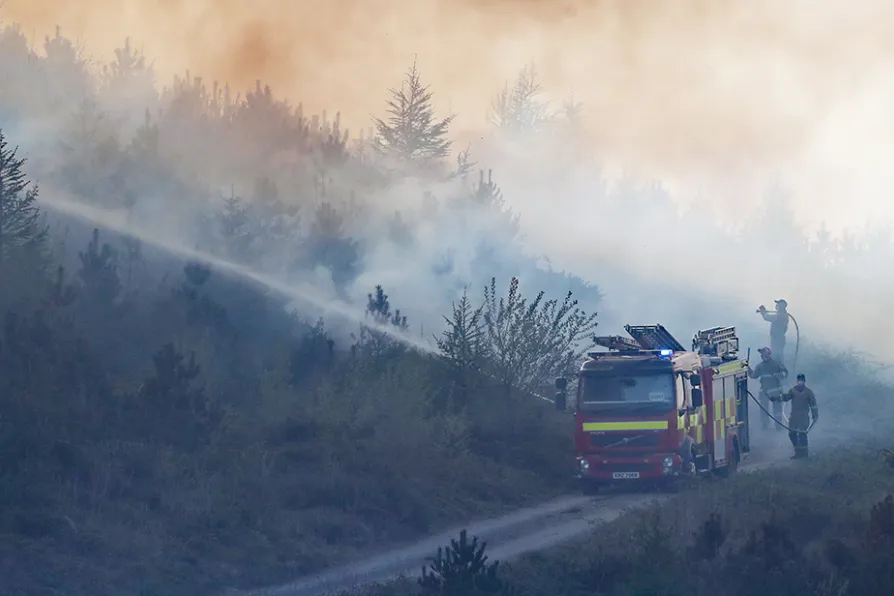Labour prospects in May elections may be irrevocably damaged by Birmingham Council’s costly refusal to settle the year-long dispute, warns STEVE WRIGHT
When it comes to extreme weather events, from wildfires to flash floods, it’s firefighters who are on the front line of defence, but services have been cut to the bone, and government is not taking seriously its responsibility for the environment, says STEVE WRIGHT

 A blaze across a large area of gorse in Newry, where firefighters are tackling the flames which have been burning for several days, as the Northern Ireland Fire & Rescue Service said the wildfire at this stage appears to have been deliberately started, Ap
A blaze across a large area of gorse in Newry, where firefighters are tackling the flames which have been burning for several days, as the Northern Ireland Fire & Rescue Service said the wildfire at this stage appears to have been deliberately started, Ap
THIS year’s International Workers’ Day was the hottest on record in the UK.
May Day has a long, proud history, with its origins in the struggle for an eight-hour working day towards the end of the 19th century. But while the fight for justice and workers’ rights never wavers, the climate is changing. Last year, May temperatures reached the highest they have ever been globally.
These soaring temperatures are a wake-up call. The climate emergency won’t wait, and it can’t be separated from workers’ struggles. No-one is more aware of this than firefighters, who are already battling to save lives from increasing extreme weather events across the world.
For firefighters, it is obvious that the climate crisis is a workplace crisis — and that fighting it requires an internationalist outlook. Fire service workers are facing increasing wildfires and floods in countries across the world, united across borders by a shared commitment to save lives from the deadly impact of rising temperatures.
Derbyshire firefighters spent May 1 tackling a huge wildfire in the Peak District.
The risk of catastrophic wildfires shoots up at this time of year. The Scottish Fire and Rescue Service issued an “extreme wildfire warning” in April, and the first week of the month saw over 44,000 acres burned: the highest weekly total on record, with wildfires blazing in rural areas of Scotland, Wales, England and Northern Ireland.
Neoliberalism and the ideology of austerity have left fire services ravaged by cuts across large parts of the world. When we hosted firefighters from across Europe for a forum earlier this year, our calls for investment in the fire service were echoed by everyone in the room.
And we will never forget the harrowing scenes from the California wildfires in January, with firefighters doing everything they could to fight an unprecedented inferno while resources had been cut to the bone.
It is our duty as firefighters to serve and protect our communities, and to fight for better conditions and the health and safety of our colleagues. Responding to floods and wildfires without enough resources, equipment or the number of crews needed is extremely difficult and dangerous work.
We continue to demand that the British government face the reality of climate change and fund the fire and rescue service, reversing the loss of over 12,000 firefighters since 2010.
Britain remains woefully unprepared for extreme weather events, with a lack of co-ordination and strategy meaning that fire service resources are a postcode lottery. The FBU is demanding a statutory duty for fire and rescue services to respond to flooding, to guarantee funding. And there is still no clear plan for if we experience a repeat of the wildfires that devastated areas across England during the 2022 heatwave — including destroying an entire street of houses in outer London.
But ministers must also go far beyond mitigation and adaptation: it is the government’s responsibility to do everything in its power to prevent further environmental destruction, to save lives in the near future. With Tony Blair joining the Conservatives and Reform in attacking net-zero targets this week, it falls on our movement to unite and fight for this urgent climate action.
We cannot allow right-wing politicians to pit workers against each other and pin the blame for falling standards of living on decarbonisation.
While the rich will be able to escape the impact of increasing heat — with air conditioning, spacious and cooler homes, access to outdoor space — the majority of homes and workplaces are unequipped for rising temperatures.
This means more workers suffering from heat-related illnesses in increasingly hazardous conditions.
Heatwaves are set to get longer and hotter, but we still don’t have a maximum working temperature to protect lives in the workplace. The European Trade Union Confederation found that heat-related deaths at work have increased by 42 per cent in the EU since 2000.
We must reach every workplace and organise every worker with the message that the climate emergency is a class issue. It is a story of bosses profiting while workers suffer, but there is hope. We can change this by getting organised as workers in trade unions.
With the far right threatening to set the world on fire, climate justice led by workers is the only alternative.
Steve Wright is general secretary of the Fire Brigades Union.

Since 2010, one in five firefighter jobs has disappeared alongside 30% funding cuts — all while climate breakdown brings record blazes and flooding. It’s time to fund our fire service properly, writes FBU general secretary STEVE WRIGHT













